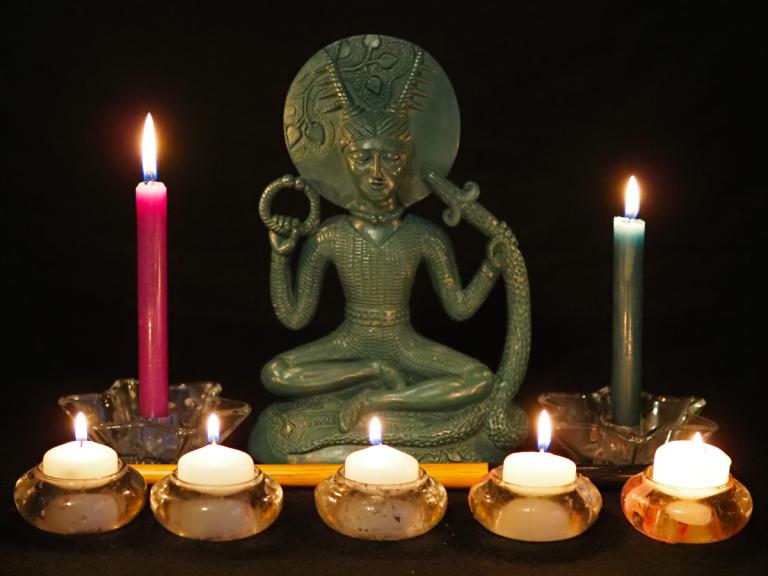While I was on Winter Break, I came across someone on one of the social media platforms who asked “do witches do deity work?”
By the time I saw it there were already several dozen responses and some of them were good, so there was no need for me to add my own. But the more I thought about it the more I felt like I needed to respond, and to respond at greater length than would fit into a BlueSky or Threads post.
Do witches do deity work? The simple answer is that some do and some don’t. Witchcraft is a craft – something you do – a practice that can be done in the context of any religion or no religion at all. I have friends who are effective witches who either do not believe in the existence of any Gods, or who do believe in their existence but choose to avoid them. Those are perfectly valid approaches.
But my practice begins with devotion to the deities in my life. More relevantly to the original question, my magic and witchcraft were highly ineffective until I dealt with my religious baggage (one of these days I’m going to teach a class on “unpacking your religious baggage”). “Deity work” isn’t a term I use often, but I couldn’t do what I do without regular attention to the Gods in my life.
What does “deity work” mean?
The idea of “working with” a God or Gods is still rather contentious in the Pagan and polytheist communities. While I think that argument is mostly unhelpful, it is important that we understand the difference between working with deities, serving deities, and worshipping deities. I covered that in this post from 2019 and I’m not going to repeat it here, except to say that I do all of the above in my practice.
Witches whose primary interest is in working magic often have different priorities than those whose primary interest is the Gods themselves. But when discussing the topic of “deity work” it’s important to understand what we’re talking about.
The Gods are whole persons, not just functions
When someone asks “which God do you go to for this or that?” my response it always “the God you know.” Yes, historically many Gods were patrons of various functions, but first they were Gods of people. Athena was a Goddess of wisdom and a Goddess of war, but she was also the Goddess of the people of Athens.
In our time, most connections between deities and nationalities have been broken, or at least severely diminished. The primary connections are between deities and individuals.
A long time ago I had a need, and so I prayed – earnestly and reverently – to a deity traditionally associated with that need. The response I got was “who are you and why should I do anything for you?” If you need money, where do you think you’ll get a better response: from Warren Buffett or Bill Gates or the current Secretary of the Treasury, or from your much less rich but still wealthy uncle who you see at family gatherings and talk to on an occasional basis?
Gods are whole persons, not just the personification of functions. Go to who you know.
Reciprocal relationships, not transactions
The Gods are not vending machines, nor are they so small they can be bribed with a glass of wine you probably weren’t going to drink anyway. Gods are the mightiest of spirits, with wisdom and power far beyond our own. But they are not so far beyond us that we cannot form and maintain relationships with them.
We build relationships with the Gods through spiritual practice: through prayer (speaking to them), mediation (listening for them), and offerings (giving in hospitality and reciprocity). And through incorporating their virtues and values into our lives.
The virtue of hospitality says we give because it’s the right thing to do, to show respect for the needs and the dignity of others, whether human or divine or otherwise. The virtue of reciprocity says we give to others so they will give to us, so we may give again in turn. Where hospitality ends and reciprocity begins isn’t always clear, and that’s not really a problem. The benefit of both is in a relationship.
When I was young, my small friend group helped each other move numerous times. There was an element of reciprocity to it: I helped them and in return they helped me. And also, the person/couple whose house was being moved provided pizza and beer (and also frozen Snickers bars while we were working). But more than that, we were friends. We had known each other for a long time, we were in each other’s weddings – we helped each other because that’s what friends do.
The role of the Gods in magic
Magic works in three ways. One part is the manipulation of energies and correspondences directed at a target, which – if done skillfully – influences and impacts the target for the better. One part is psychological programming. Your spellwork triggers something in your subconscious mind, which causes you to change your behaviors, which brings the desired result. And one part is the intercession of Gods and other spirits. We pray and make offerings and they intervene on our behalf – or not, as they see fit.
When you have an active, respectful, reciprocal relationship with a deity, they’re more likely to intervene when you ask.
But also, when you have a strong relationship with a deity, you’re more likely to understand their values and virtues and to incorporate them into your life. That brings you into alignment with them. And because your desires are aligned with their desires, you’re more likely to ask for the kinds of things they would be inclined to help you with in the first place.
So when people talk about “deity work” my first questions are “which deity or deities?” and “what is their place in your life?”
Incorporating deity work into your magic
Assuming you already have a relationship supported by regular devotional practice, what does deity work look like in the context of a magical practice?
Sometimes it’s a big liturgical ritual that casts a circle and invites all the usual spiritual allies to attend: the spirits of the elements and directions, land spirits, ancestors, and anyone else you normally invite (for me, that’s the Fair Folk). You invite the appropriate deity and honor them with offerings and praise. Then, in the center of the ritual where you would normally put a seasonal celebration, you put a magical working – ideally something already aligned with their virtues and values.
Other times it’s a simpler working: a spell or a set of chaos magic sigils. As you complete it, you address the appropriate deity and say something like “I ask you to add your magic to mine, that this may become reality.”
And sometimes it’s just an extemporaneous prayer: “I really need this, and I’d appreciate it if you would help me get it.” I have occasionally prayed “if you want me to do this big thing for you, I need you to help me get these things I have to have to do it.”
Remember to offer thanks any time you include a deity in your magical workings and the working comes through. At the least, this means saying “thank you.” Oftentimes, that’s enough. Other times, special offerings may be appropriate. And of course, if you offered any quid pro quo (“do this for me and I will do that for you”) carry through on your promise as soon as possible.
The primary purpose of deity work is nurturing relationships
Have you ever had a friend who seemed like they were always asking you for favors? Or worse, expecting them? How did you feel about that friend? Did you wonder if they really cared about you or if they were only interested in what you could do for them?
I would not presume to know how any deity feels about people who approach them in such a manner. Perhaps they’re beyond all that. Or perhaps they’re as disturbed about it as we are when it happens to us.
But respect for a person means appreciating them for who and what they are in their entirety. Reciprocity means giving as well as receiving. Hospitality means caring for someone simply because they’re there, with no expectations beyond gracious acceptance.
What does Cernunnos do for me? What does the Morrigan do for me? They’re in my life. I’m part of their work. And that’s enough, even if many times they do much more.

















